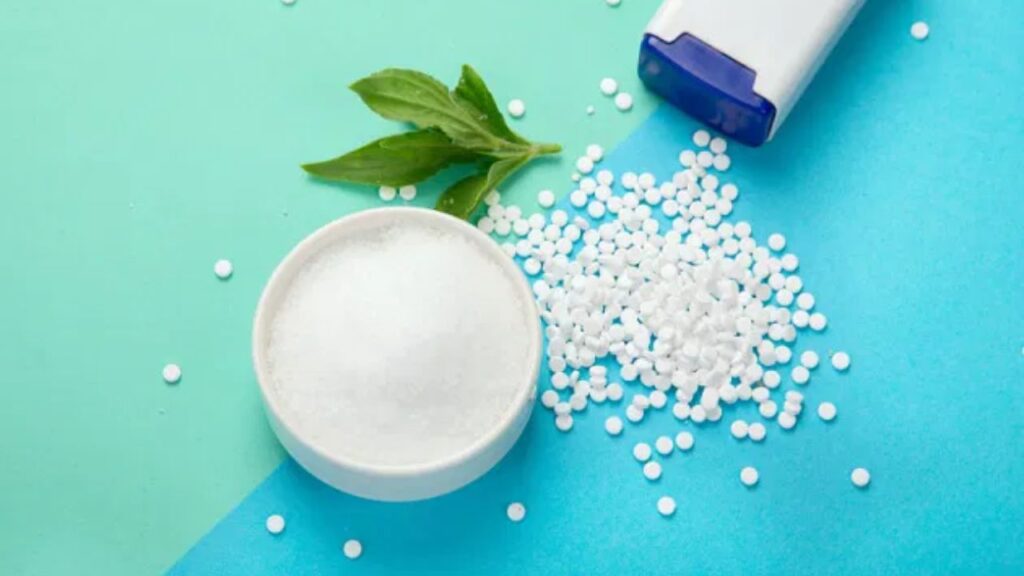Artificial Sweetener Causes Higher Risks of Blood Clotting: According to a recent study by Cleveland Clinic stated that 10 people who drank drinks with erythritol which is an artificial sweetener had twice higher risks of blood clotting.
Erythritol is a sugar alcohol or artificial sweetener that is used to add volume to stevia and monk fruits, sweeten low-carb keto products, and reduce calories in drinks and foods.
Researchers have found that this sugar alcohol increases blood clots in those people who take it. These blood clots block the blood vessels traveling to the heart that cause a heart attack or block the blood vessels traveling to the brain and cause a stroke.
Also Read: Cole Hocker Won Gold for America: End of Ingebrigtsen-Kerr Rivalry
This study was published by the journal Arteriosclerosis, Thrombosis, and Vascular Biology on Thursday.
Stanley Hazen who is the senior author and the director of the Center for Cardiovascular Diagnostics and Prevention at the Cleveland Clinic said, “What is remarkable is that in every single subject, every measure of platelet responsiveness (clotting) went up following the erythritol ingestion.”
Stanley Hazen noted that the small test included a total of 20 volunteers, among which 10 were given drinks with 30 grams of erythritol while the other 10 people were given drinks with 30 grams of glucose.
When the result came, Hazen said that in the 10 people who were given drinks with 30 grams of glucose, their blood platelet activity did not change.
Also Read: Taylor Swift’s Vienna ‘Eras Tour’ shows canceled after allegedly terror attack on her concerts
But for the other 10 people who were given 30 grams dose of erythritol their blood platelet activity changed significantly which was very surprising for them.
Stanley Hazen said, “We saw enhanced clotting, using measures of how quickly clots will occlude a vessel or stop blood flow, which is like a model of a heart attack or a stroke.”
He said, “(Erythritol) remained elevated above the threshold necessary to trigger and heighten clotting risk for the following two to three days,”
Hazen further added, “This is the first direct head-to-head comparison of the effects of ingesting glucose versus ingesting erythritol on multiple different measures of platelet function. Glucose doesn’t impact clotting, but erythritol does.”
Furthermore, most of the people among the 20 volunteers were of an average age of 30 years old.
Stanley Hazen is also the Jan Bleeksma chairman in vascular cell biology and atherosclerosis at the Cleveland Clinic.
Also Read: Nearly 48% of the Student Loan Borrowers Expects Debt Forgiveness
Stanley Hazen said, “Based on the current data, it looks like it’s safer to drink a glucose-sweetened drink rather than an erythritol-sweetened drink. I recommend my patients avoid the artificial sweeteners and sugar substitutes, to try to eat whole foods, to stay away from processed foods, and to shop the produce section.”
Dr. Andrew Freeman who is the director of cardiovascular prevention at National Jewish Health noted, “I’m not saying we need to cease using these sugar alcohols immediately, but this line of research certainly begs the question: Are they safe or not?”
CNN reported that they also took the blood of more than 4,000 people in the US and Europe. They did research and found out that those with the highest amounts of erythritol had higher chances of having a heart attack or stroke.
He said, “What we’re seeing with erythritol is the platelets become super responsive: A mere 10% stimulant produces 90% to 100% of a clot formation.”
The director of the Center for Cardiovascular Diagnostics and Prevention at the Cleveland Clinic further noted “Cardiovascular disease builds over time, and heart disease is the leading cause of death globally. We need to make sure the foods we eat aren’t hidden contributors.”
According to the reports, 30 years of study shows that Erythritol is a good sugar sweetener that helps to lower your sugar intake and reduce calories.
While concluding Hazen suggests avoiding Erythritol for now and as a substitute, he says to use honey or fruit for sweetening.
Also Read: Tropical Storm Debby Will Hit Virginia and Move Towards Pennsylvania on Friday’s Evening



